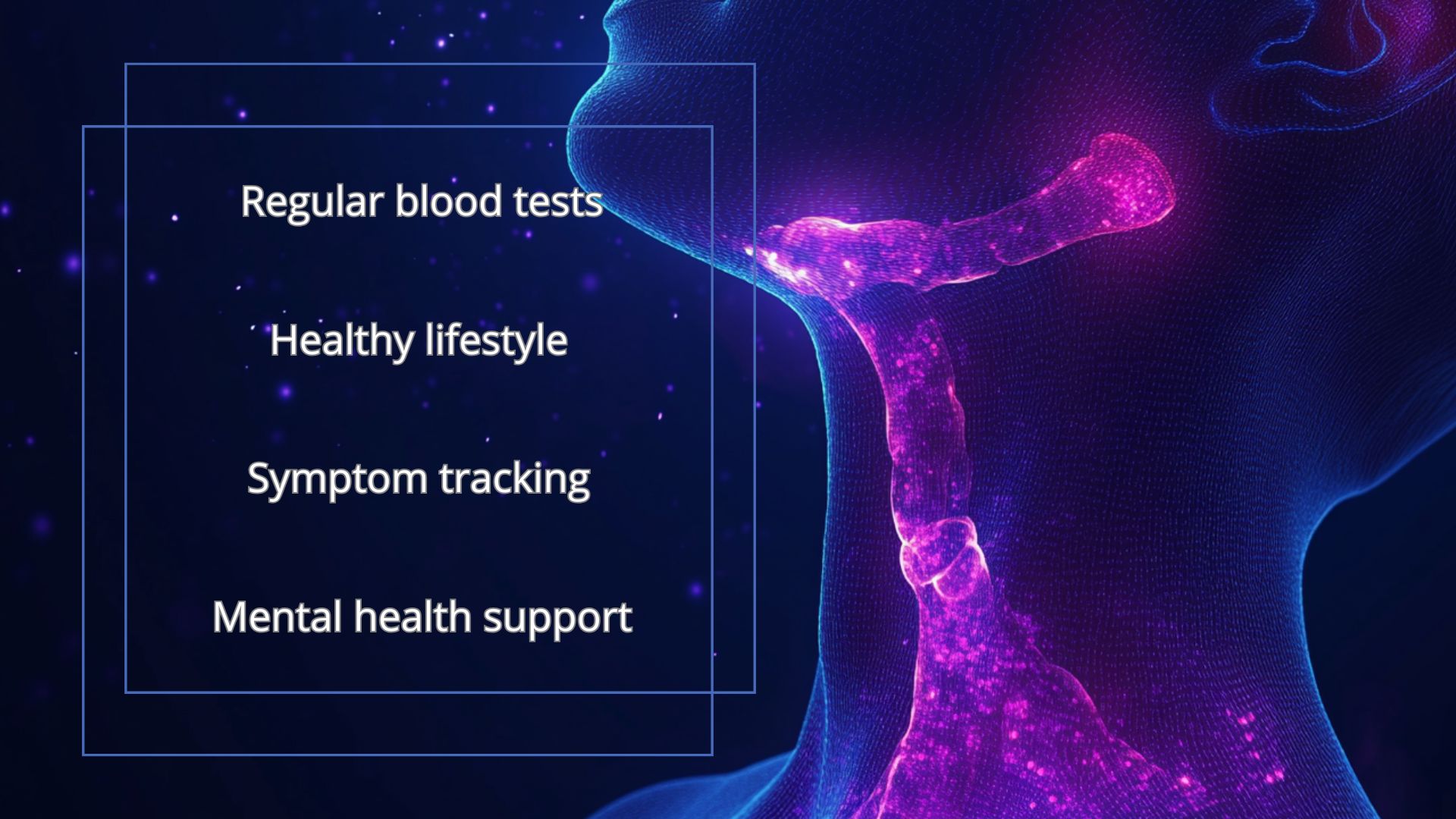The thyroid gland is a small organ in your neck. It plays a big role in how your body works. It produces hormones that handle metabolism, energy, and even brain health. When it doesn’t work properly, it can lead to thyroid dysfunction. This condition includes issues like hypothyroidism and hyperthyroidism. These can affect many parts of the body. It includes the nervous system. And it can lead to neurological symptoms like:
- Brain fog
- Memory issues
- Nerve pain
The nervous system, which includes your brain, spinal cord, and nerves, is sensitive to changes in thyroid hormones (T4 and T3). These hormones help nerve cells communicate. They support brain development and keep mental functions sharp. When T4 and T3 levels are too high or too low, it can disrupt these processes. It causes symptoms that range from mild discomfort to significant challenges in daily life. In this article, we’ll explore how this dysfunction impacts the nervous system, what symptoms to look out for, and how to cope with them effectively.
Understanding Hypothyroidism and Hyperthyroidism
Hypothyroidism happens when the gland doesn’t produce enough hormones. This slows down your body’s metabolism. It leads to symptoms like fatigue, weight gain, dry skin, and feeling cold all the time. It can also affect brain health. It causes issues like slow thinking, memory problems, and difficulty concentrating. For example, someone with hypothyroidism might feel mentally sluggish or struggle to focus on simple tasks. It can feel frustrating and overwhelming.
On the other hand, hyperthyroidism occurs when the thyroid gland produces too many hormones. It speeds up metabolism. Common symptoms include rapid heartbeat, weight loss, anxiety, and feeling overly warm. For the brain, it can cause restlessness, irritability, and trouble sleeping. It can make it hard to stay calm or think clearly. Both conditions can disrupt the delicate balance of the nervous system. It leads to a range of neurological issues that affect daily life.
Here’s a quick comparison of how these states impact brain health:
- Hypothyroidism. Slowed mental processes, memory lapses, depression, and difficulty focusing.
- Hyperthyroidism. Anxiety, irritability, racing thoughts, and trouble concentrating.
Both conditions can make it hard to perform at your best, whether at work, school, or home. Recognizing these symptoms early is key to getting the right treatment and protecting your health.
Neuropathy and Sensory Disturbances
One lesser-known effect of dysfunction is neuropathy. It’s a condition where the nerves outside the brain and spinal cord are damaged. It can cause sensations like tingling, numbness, or burning pain. They are often in the hands and feet. For people with thyroid issues, neuropathy might feel like pins and needles or a constant ache. It makes everyday tasks uncomfortable.
In hypothyroidism, low T4 levels can slow nerve signaling. It leads to sensory disturbances. For example, you might notice your fingers tingle when you hold a cup or your feet feel numb after walking. Hyperthyroidism can also cause neuropathy, though it’s less common. High hormone levels can overstimulate nerves. It leads to muscle weakness or twitching.
These symptoms can vary in severity. Some people might only feel mild tingling. Meanwhile, others experience pain that disrupts sleep or daily activities. If you notice these sensations, it’s important to talk to a doctor. It is because those issues could be linked to dysfunction. Treating the underlying thyroid issue often helps reduce or eliminate neuropathy symptoms.
Cognitive Impairment and Brain Fog
Another major impact of thyroid dysfunction is cognitive impairment. It’s often described as “brain fog.” This can feel like your mind is cloudy. It makes it hard to remember things, focus on tasks, or think clearly. For example, you might forget where you parked your car or struggle to follow a conversation. These issues can be especially frustrating because they affect work, relationships, and overall quality of life.
In hypothyroidism, brain fog is often linked to low energy and slowed brain activity. Thyroid hormones are essential for fueling brain cells. So, when levels are low, mental functions take a hit. People might feel like they’re moving in slow motion mentally. In hyperthyroidism, the opposite happens. Your brain might feel overstimulated. And it leads to scattered thoughts or difficulty staying on task.
Here are some common mental symptoms linked to thyroid dysfunction:
- Trouble remembering names, dates, or recent events
- Difficulty focusing on tasks like reading or problem-solving
- Feeling mentally “foggy” or disconnected
- Slower reaction times or trouble processing information
These symptoms can make you feel unlike yourself. However, the good news is that treating thyroid dysfunction often improves mental clarity. With the right care, many people notice their memory and focus return to normal.
The Role of Thyroid Hormones in Nervous System Regulation
Thyroid hormones are mainly T3 (triiodothyronine) and T4 (thyroxine). They are critical for keeping the nervous system healthy. These hormones act like messengers. They tell cells how to function. In the brain, they help nerve cells grow, communicate, and repair themselves. They also support the production of neurotransmitters. Those are the chemicals that carry signals between brain cells.
During childhood, these hormones are vital for brain development. A lack of these hormones in early life can lead to developmental delays. That is why newborns are often screened for thyroid issues. In adults, hormones keep the brain sharp. It is done by supporting memory, attention, and mood regulation. When hormone levels are off, it can disrupt these processes. And can lead to the neurological symptoms we’ve discussed.
For example, low thyroid hormone levels in hypothyroidism can reduce blood flow to the brain. It slows down mental functions. In hyperthyroidism, excess hormones can overstimulate the nervous system. It causes anxiety or tremors. Balancing these hormone levels is crucial. It’s vital for keeping the nervous system running smoothly.
Diagnosis and Treatment of Neurological Symptoms
If you’re experiencing neurological symptoms like neuropathy or brain fog, getting a proper diagnosis is the first step. Doctors typically start with a physical exam and a review of your symptoms. They may also order blood tests to check thyroid hormone levels (T3, T4, and TSH, or thyroid-stimulating hormone). These tests help confirm whether you have hypothyroidism, hyperthyroidism, or another thyroid issue.
In some cases, extra tests might be needed to assess neurological symptoms. For example:
- Nerve conduction studies. These measure how well your nerves send signals and can confirm neuropathy.
- Brain imaging. Scans like an MRI or CT might be used to rule out other causes of mental issues.
- Cognitive testing. Simple tests can evaluate memory, attention, and problem-solving skills.
Once thyroid dysfunction is diagnosed, treatment can begin. For hypothyroidism, doctors often prescribe synthetic thyroid hormones, like levothyroxine, to restore normal levels. For hyperthyroidism, treatments might include meds to slow hormone production, radioactive iodine therapy, or, in some cases, surgery. As hormone levels stabilize, many neurological symptoms improve or disappear entirely.
It’s worth noting that treatment isn’t one-size-fits-all. Your doctor will tailor the approach based on your symptoms, hormone levels, and overall health. Regular follow-ups are important to make sure the treatment is working and to adjust it if needed.
Long-Term Management and Monitoring
Managing thyroid dysfunction and its neurological symptoms doesn’t stop with treatment. Long-term care is essential to prevent symptoms from coming back and to maintain a good quality of life. This involves regular check-ups, lifestyle changes, and staying proactive about your health.
Here are some strategies for long-term management:
- Regular blood tests. Tracking thyroid hormone levels helps ensure your treatment is on track. Your doctor might adjust your medication based on these results.
- Healthy lifestyle. Eating a balanced diet, exercising regularly, and managing stress can support T4 and brain health. Foods rich in iodine, like fish and dairy, can help the thyroid gland function. However, talk to your doctor before making big dietary changes.
- Symptom tracking. It is a valuable tool for managing health concerns. Keep a detailed journal of symptoms such as brain fog, tingling, fatigue, or memory issues. Note the time, duration, and potential triggers like diet, stress, or environmental exposures. This record helps you and your doctor find patterns and causes and develop targeted treatment plans. Consistent tracking empowers you to take control of your health. It also provides critical information for accurate diagnosis and effective management of symptoms.
- Mental health support. If cognitive issues or mood changes persist, consider therapy or counseling to cope with the emotional impact of thyroid dysfunction.
It’s also important to work closely with your healthcare team. Endocrinologists, neurologists, and primary care doctors can collaborate to address both thyroid dysfunction and neurological symptoms. If you notice new or worsening symptoms, don’t hesitate to speak up. It is because early action can prevent complications.
Living with thyroid dysfunction can feel challenging. It is especially true when it affects your brain and nerves. But with the right diagnosis, treatment, and ongoing care, most people can manage their symptoms and live full, active lives. By staying informed and proactive, you can take control of your health and manage your condition effectively.













I've given up... the stress her office staff has put me through is just not worth it. You can do so much better, please clean house, either change out your office staff, or find a way for them to be more efficient please. You have to do something. This is not how you want to run your practice. It leaves a very bad impression on your business.
Please, leave your review
Write a comment: